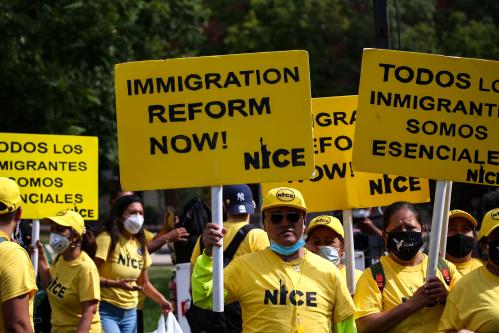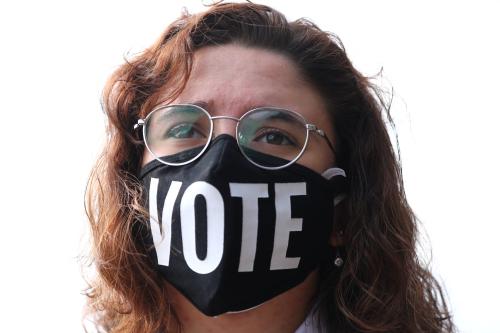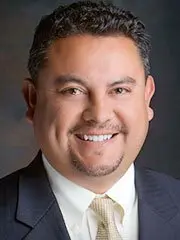The COVID-19 pandemic exposed several major weaknesses in the U.S. health care and human services systems that exacerbated inequalities facing the immigrant community. Without access to the benefits provided by the Affordable Care Act, for example, immigrants had much lower rates of insurance coverage and were much less likely to have a primary care provider before the pandemic spread like wildfire across the country. In addition, punitive immigration law led to low utilization of the few public benefits some immigrants have access to. Chief among these punitive laws is the Trump administration’s highly damaging public charge rule.
The Trump public charge rule, which went into effect on February 24, 2020, essentially counted the use of specific health or human services programs or expected future use of those services as a negative when evaluating specific immigration applications. Although the law only applies the public charge test to a small segment of the immigrant community, the law created a “chilling effect”, where even those who are eligible for public benefits, including Medicaid, choose to avoid doing so for fear that their immigration status might be impacted.
Despite the rollback of the public charge rule by the Biden administration and the Department of Homeland Security, mixed-status immigrant families may still be hesitant to apply for public assistance programs in fear of jeopardizing their immigration statuses. With the rescinding of the public charge rule, the policy returned to the rules outlined in a March 1999 field guidance, which states that immigration officers generally cannot consider non-cash public benefits in evaluating immigration applications.
The Protecting Immigrant Families Coalition/BSP Research Survey (conducted September 1 – 30, 2021) makes clear that the Trump public charge rule continues to have a powerful “chilling effect” on immigrant families. A combination of lack of information and misinformation helps explain the low uptake. Nearly half (46%) of families who needed assistance during the COVID-19 pandemic abstained from applying for assistance due to concerns over how doing so could impact their immigration status. Furthermore, more than two in five respondents believe “applying for assistance programs could cause immigration problems,” and 34% were unsure of the consequences of using public assistance programs.
Many groups have called for messaging that would increase information uptake to hopefully combat the fear of utilizing public services. The survey reinforces the need for this outreach. Only 22% of immigrant families “have heard a lot” about the Biden administration’s changes to the Trump public charge rule earlier this year, and three-in-ten respondents said they had heard ‘nothing at all’. This is a powerful indicator of the need for more outreach to the immigrant community. Awareness was especially low among AAPI communities (16% heard a lot compared to 27% among Latinos).
Fortunately, the survey suggests that an information outreach campaign could help address this challenge. Participants were provided with information about changes to the policy environment and 50% reported that they were more interested in applying for public assistance now that they had heard more about the policy shift. The benefits of hearing more information about the policy change are even greater for Latinos (54% more likely compared to 45% AAPI respondents).
What Can be Done to Increase Knowledge and Decrease Fears Among Immigrants and Their Families?
To address the information gap, there are several action items that can be implemented by governments at the federal, state, and local levels, advocacy organizations, and others interested in helping improve uptake of federal resources at a time when many families could benefit tremendously from doing so. A coordinated outreach effort led by the federal government that leverages the large health and social service infrastructure of state and local governments could be a game-changer. This outreach effort would ideally utilize messages proven to be persuasive with immigrants and their families.
These messages could stress that there are no immigration consequences associated with utilization of services and that identify specific resources available to residents, such as this example: “Your family counts on you, and you always do what it takes. And applying for public programs like WIC and SNAP will have no immigration consequences for you or for anyone in your family. Find out how WIC and SNAP can help you get your family the food they need to thrive.”
We also recommend that such messaging references the presidential administrations associated with the change in policy environment. Here is an example that tested very well in the survey: “President Biden has ended the Trump administration’s policies that put immigrants and their families at risk if they used healthcare, nutrition, or housing programs. It is now legal and safe to apply.”
Given the climate of fear and misinformation, it is critical to utilize effective messengers in outreach efforts. This includes organizations that have strong relationships with immigrants and are trusted sources of information. Information must also be communicated bilingually and through multiple channels ranging from television to social media to ensure wide saturation of content. Finally, the survey finds that U.S.-born and naturalized immigrants are good messaging targets to convince others in their mixed-status families that the Trump-era policies are gone and access has been restored to government programs.
Thawing the public charge chilling effect is key for increasing access to health care and social services as the nation responds to the health and economic consequences of COVID-19. The Biden administration has taken aggressive steps to change the policy but more work is needed to ensure immigrants and their families are aware of this policy shift and feel safe utilizing resources that they need.







Commentary
It’s time for the Biden administration to let immigrants know about the public charge rule change
January 19, 2022